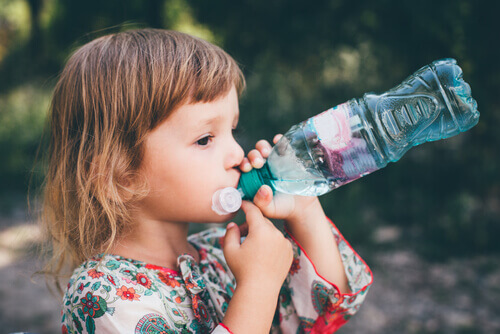7 Tips to Combat Childhood Constipation

In this article we’ll provide seven tips to help combat childhood constipation, which can be caused by a number of factors.
The digestive system in children is more delicate than in adults. It’s also somewhat difficult to get children to eat a balanced diet, since they often want sweet and fatty foods instead of vegetables and whole foods.
This obviously has a great impact on the digestive process. Although children have healthy organs, complications can occur when a child doesn’t eat enough fiber or isn’t well hydrated.
That’s why it’s important to teach children the value of following a good diet in order to avoid these problems.
You can start by trying to give them healthier foods such as a fruit salad. If your child completely rejects it, try adding pieces of chocolate or a topping he likes in order to open up new options.
Keys to combat childhood constipation
One of the most common problems in terms of childhood digestion is constipation.
However, childhood constipation can also develop because of stress caused by parents and other factors apart from their diet.
Below we’ll tell you seven ways to combat childhood constipation. It never hurts to know these types of home remedies, since they can help avoid having to visit the pediatrician or emergency room.
1. Take into account excessive sugar intake
As we’ve mentioned before, children can be quite attached to their sugar intake, since sweets are very attractive products for them.
However, there is evidence that when a child is under 6 years of age, it’s normal for him to have problems processing sugar.

That’s why a common mistake mothers make is to use jams as a remedy for childhood constipation.
These jams and jellies are rich in sugars, so they’re unlikely to be digested correctly and can also lead to the development of more gastrointestinal problems.
It should also be noted that plum jam or prune puree, which is the jam variety most mothers turn to for childhood constipation, is a very strong compound for children under 2 years of age.
This concoction can cause gas, colic and abdominal pain.
It’s recommended that you use fruits rich in fiber and that the jam be prepared at home so you can be sure it’s a totally organic product.
2. Feed grapes in the morning
Another recipe used to combat childhood constipation should be grapes, because these fruits are easy to digest and help further the digestion process, thus eliminating constipation.
For the full benefits of this fruit, it’s best to give your child between 6 to 8 grapes, including the skin, in the morning. Then, wait 20 minutes before eating breakfast.
In addition to this, to prevent chronic constipation, you must verify that your child doesn’t suffer from any type of intolerance, as this is usually the cause of recurrent intestinal problems.
3. Diet rich in fiber
Having good digestion depends mainly on the intake of fiber, since this is the compound responsible for transporting waste through the colon in a more fluid way.
So, one of the recipes against childhood constipation is undoubtedly a plate of whole grains.
You can also offer your child a breakfast with whole grains and a fruit salad, such as strawberry, kiwi or pear.
This way, your child can start the day by absorbing the fibers of fruits and cereals.
Bear in mind that the amount of fiber a child should consume can be determined by adding 5 to their age. So if a child is 9 years old, the recommended amount of fiber is 14 grams.
4. Avoid these foods
There are undoubtedly certain foods that increase constipation and even cause this problem.
That’s why we must avoid at all costs feeding these to our children in harmfully excessive amounts.
The child shouldn’t eat sweets or candy on a recurring basis. He should also avoid ice cream, cheese, milk heavily laden with cream, rice and white bread.
5. Take hydration into account
One of the best ways to combat childhood constipation has to do with hydration.
Drinking water helps us quench our thirst and also greatly influences our digestion.
If it’s difficult for an adult to have adequate water intake, for a child it’s even more so. Children usually prefer more “fun” drinks, especially sweet ones.
Therefore, you can choose to use water bottles with their favorite characters on them; if the packaging is striking, it’s more attractive to children.

6. Massage with olive oil and warm water
This is a very effective recipe against childhood constipation. It’s a trick or home remedy that always works.
If your child is suffering from constipation, give him a bath with warm water that lasts at least 15 minutes to completely relax his body.
Then, use olive oil to massage the abdominal area with circular motions.
This will improve bowel flow and eliminate constipation.
7. Take stress into account
One of the causes of childhood constipation may be stress, since children relate this sensation to sphincter control.
For this reason, after being very hard with them, scolding them or demanding too much, it’s normal for them to present this intestinal problem.
In these cases, the best thing you can do is take into account the cause and talk to him so that he calms down as soon as possible.
All cited sources were thoroughly reviewed by our team to ensure their quality, reliability, currency, and validity. The bibliography of this article was considered reliable and of academic or scientific accuracy.
- Christodoulides S, Dimidi E, Fragkos KC, Farmer AD, Whelan K, Scott SM. Systematic review with meta-analysis: effect of fibre supplementation on chronic idiopathic constipation in adults. Aliment Pharmacol Ther. 2016 Jul;44(2):103-16.
- Boilesen SN, Tahan S, Dias FC, Melli LCFL, de Morais MB. Water and fluid intake in the prevention and treatment of functional constipation in children and adolescents: is there evidence? J Pediatr (Rio J). 2017 Jul-Aug;93(4):320-327.